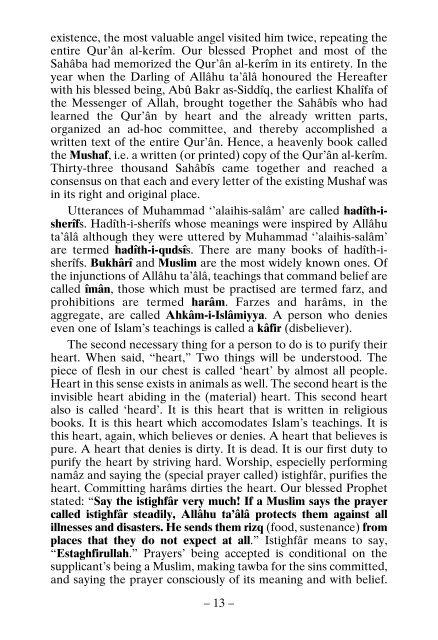Belief and Islam
BELIEF AND ISLAM star This work, Belief and Islam, originally was written in Persian under the title I’tiqâd-nâma by Hadrât Mawlânâ Khâlid al-Baghdâdî, a profound ‘âlim of Islam and a specialist in ma’ârif of tasawwuf. Hâji Faydullah Effendi of Kemah, a khalîfa of great walî Mavlânâ Mahmûd Sâhib, the brother of the author, translated the book into Turkish and named it Farâid-ul-fawâid which was printed in Istanbul in 1312 A.H.[1894]. Our bookstore had it translated again from the Persian original into Turkish and, some explanations and three chapters, published it with the title Imân ve Islâm in 1966. German, French and Arabic versions are also published by our bookstore. This book, explains five fundamentals of Islam, six fundamentals of îmân and the contemporary information about the matter and refutes those who are against Islam and those who are lâ-madbhabî.
BELIEF AND ISLAM
star This work, Belief and Islam, originally was written in Persian under the title I’tiqâd-nâma by Hadrât Mawlânâ Khâlid al-Baghdâdî, a profound ‘âlim of Islam and a specialist in ma’ârif of tasawwuf. Hâji Faydullah Effendi of Kemah, a khalîfa of great walî Mavlânâ Mahmûd Sâhib, the brother of the author, translated the book into Turkish and named it Farâid-ul-fawâid which was printed in Istanbul in 1312 A.H.[1894]. Our bookstore had it translated again from the Persian original into Turkish and, some explanations and three chapters, published it with the title Imân ve Islâm in 1966. German, French and Arabic versions are also published by our bookstore. This book, explains five fundamentals of Islam, six fundamentals of îmân and the contemporary information about the matter and refutes those who are against Islam and those who are lâ-madbhabî.
You also want an ePaper? Increase the reach of your titles
YUMPU automatically turns print PDFs into web optimized ePapers that Google loves.
existence, the most valuable angel visited him twice, repeating the<br />
entire Qur’ân al-kerîm. Our blessed Prophet <strong>and</strong> most of the<br />
Sahâba had memorized the Qur’ân al-kerîm in its entirety. In the<br />
year when the Darling of Allâhu ta’âlâ honoured the Hereafter<br />
with his blessed being, Abû Bakr as-Siddîq, the earliest Khalîfa of<br />
the Messenger of Allah, brought together the Sahâbîs who had<br />
learned the Qur’ân by heart <strong>and</strong> the already written parts,<br />
organized an ad-hoc committee, <strong>and</strong> thereby accomplished a<br />
written text of the entire Qur’ân. Hence, a heavenly book called<br />
the Mushaf, i.e. a written (or printed) copy of the Qur’ân al-kerîm.<br />
Thirty-three thous<strong>and</strong> Sahâbîs came together <strong>and</strong> reached a<br />
consensus on that each <strong>and</strong> every letter of the existing Mushaf was<br />
in its right <strong>and</strong> original place.<br />
Utterances of Muhammad ‘’alaihis-salâm’ are called hadîth-isherîfs.<br />
Hadîth-i-sherîfs whose meanings were inspired by Allâhu<br />
ta’âlâ although they were uttered by Muhammad ‘’alaihis-salâm’<br />
are termed hadîth-i-qudsîs. There are many books of hadîth-isherîfs.<br />
Bukhârî <strong>and</strong> Muslim are the most widely known ones. Of<br />
the injunctions of Allâhu ta’âlâ, teachings that comm<strong>and</strong> belief are<br />
called îmân, those which must be practised are termed farz, <strong>and</strong><br />
prohibitions are termed harâm. Farzes <strong>and</strong> harâms, in the<br />
aggregate, are called Ahkâm-i-Islâmiyya. A person who denies<br />
even one of <strong>Islam</strong>’s teachings is called a kâfir (disbeliever).<br />
The second necessary thing for a person to do is to purify their<br />
heart. When said, “heart,” Two things will be understood. The<br />
piece of flesh in our chest is called ‘heart’ by almost all people.<br />
Heart in this sense exists in animals as well. The second heart is the<br />
invisible heart abiding in the (material) heart. This second heart<br />
also is called ‘heard’. It is this heart that is written in religious<br />
books. It is this heart which accomodates <strong>Islam</strong>’s teachings. It is<br />
this heart, again, which believes or denies. A heart that believes is<br />
pure. A heart that denies is dirty. It is dead. It is our first duty to<br />
purify the heart by striving hard. Worship, especielly performing<br />
namâz <strong>and</strong> saying the (special prayer called) istighfâr, purifies the<br />
heart. Committing harâms dirties the heart. Our blessed Prophet<br />
stated: “Say the istighfâr very much! If a Muslim says the prayer<br />
called istighfâr steadily, Allâhu ta’âlâ protects them against all<br />
illnesses <strong>and</strong> disasters. He sends them rizq (food, sustenance) from<br />
places that they do not expect at all.” Istighfâr means to say,<br />
“Estaghfirullah.” Prayers’ being accepted is conditional on the<br />
supplicant’s being a Muslim, making tawba for the sins committed,<br />
<strong>and</strong> saying the prayer consciously of its meaning <strong>and</strong> with belief.<br />
– 13 –

















